Nairobi
Our first city in Africa was Nairobi, the capital of Kenya. I didn’t know what to expect upon arrival, having heard good things from friends who visited previously, but also the guidebook’s prominent mention of the city’s nickname – “Nairobbery.” In the end, the city was a little of both. We found a lot of those dualities – there was great personal service but no personal space; every Kenyan we met was nice and friendly but also constantly warned us about dangerous Kenyans; and the streets were chaotic and crowded while residences attempted to create walled-off areas of calm and quiet.
We unfortunately never had time to properly explore Nairobi, although we stayed numerous nights there in five different accommodations ranging from tents, to hostels, to apartments, to crowded home stays. Instead, Nairobi was merely the meeting point to which we kept having to return. We found that every tour, every flight, and every bus in Kenya either starts or ends in Nairobi. Therefore, we often came back to Nairobi for a night after returning from visiting another region in Kenya, just to leave the next morning. Nevertheless, because we stayed at many different places around the city (including Jami’s “worst hostel ever”), and trekked between those places often, I think we gained a very rough sense of the city.
And by the end we got used to craziness of Nairobi. In addition to the generalizations above, generally speaking, it is dirty and dusty, filled with stores, kiosks, and people. Coming from New York, Nairobi was significantly more crowded when walking, and had exponentially more trash on the ground. While parts are modern, for the most part we came across lots of poverty, dirt roads, and quick housing. It was strange (and slightly uncomfortable) for us to see a city where a Wal-Mart-like superstore exists a few hundred feet away from a street lined with mud-and-stick storefronts, and where malls and middle class housing have rows of electric fences to protect them. It was unclear whether the security is simply a product of income inequality, or something more persistent.
Our favorite time in Nairobi was when we were very touristy, and visited the Elephant Orphanage and Giraffe Sanctuary. Despite being more zoo than safari, it was a lot of fun to interact with the animals up close, in ways not allowed by US zoos.
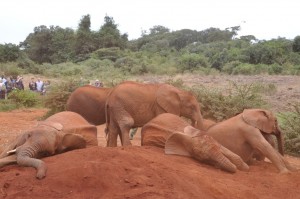
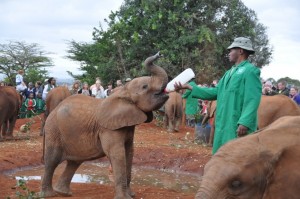
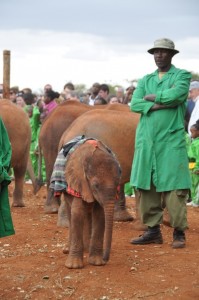
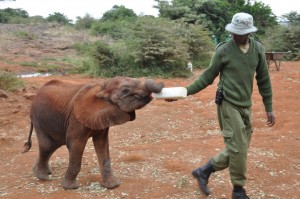 With the exception of the people, who were a consistent bright spot in Kenya, I don’t think I could ever live in Nairobi. The feeling of always being an outsider was too great, and the lack of being able to interact (safely) with the street too big a sacrifice.
With the exception of the people, who were a consistent bright spot in Kenya, I don’t think I could ever live in Nairobi. The feeling of always being an outsider was too great, and the lack of being able to interact (safely) with the street too big a sacrifice.
But despite all this, I felt an atmosphere of hope in the city (and country). The people were positive, education is a priority, and the images of poverty looked little different from pictures of the rural US from a hundred years ago. Areas without electricity were receiving power lines (even if Kenyans expressed doubts about when they would ever be activated) and Kenyans freely discussed their politics and history. It will be interesting to follow the country over the next few decades, and see whether the current poverty and poor conditions is merely the foundation of economic growth, or something that will persist.

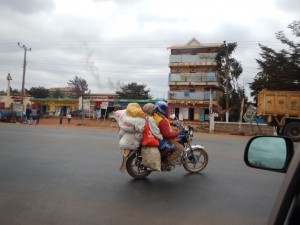
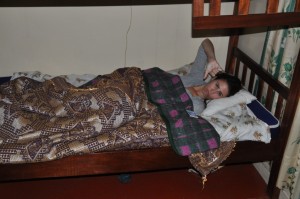
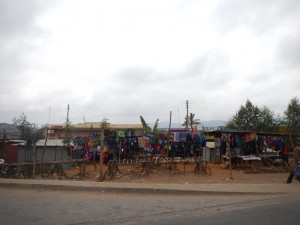
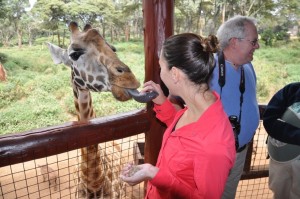
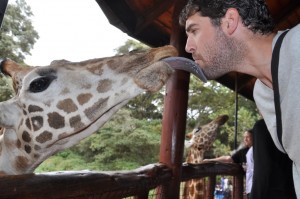
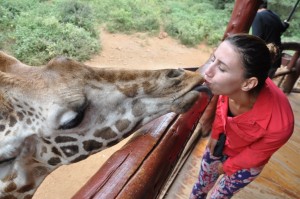
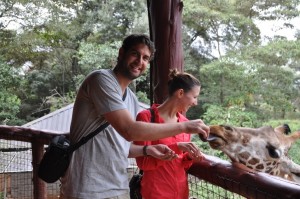
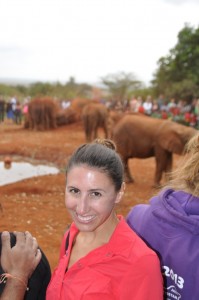
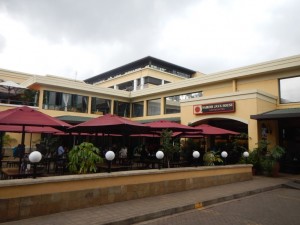
Very interesting! Loved the photos of you and the giraffes. I want to hear more about the “worst hostel ever”.
The hostel was located in the dirty, dusty, polluted, noisy, dark, overcrowded, busy and quite scary CBD/Central Business District. The hostel was hardly found as our taxi tried to drive through the hundreds of pedestrians, matatus, motorbikes and city buses, to which when we did get out I felt very uneasy. To make matters worse, we had to walk up 3 flights of cement stairs in the dark, lights were out. To open the hostel’s main door, you needed a key to the metal gate with a pad lock, this would be the same with our room. The place was dirty. Toilets did not flush and you had an option of two showers: scorching hot or freezing cold of which both just drizzled anyway. They basically had a hose that stuck out of a the wall inside a tiny cement room. The couches in the center of the hotel that surrounded the metal door with padlock rooms were filthy. I felt like I didn’t want to touch anything. To top it off, they didn’t have wifi, which they said they did, and we arrived on a Friday night and were literally surrounded by every kind of dance and music club Nairobi had to offer. I lived in NYC for MANY years and can take and actually prefer some noise but the varieties of African to Gospel to Reggae, and live singing, all going on at the same time was so much. The loud music didn’t shut off until we had to wake up early for our safari.
I wanted to add to Aaron’s post regarding the Elephant Sanctuary. While it was a big tourist stop with lots of people, it still felt special to be there, supporting such a cause. It was a real treat to see these baby elephants, but better than that was the warm and fuzzy feeling you got seeing these 3 week – 18 month baby elephants who had been rescued from the wild and brought to the orphanage, not like a zoo, but because their mother who they depended on for milk, support and safety did not survive a poachers desire for their tusk. It was so sad, but you could see these babies take to the workers as if they were their new mother, as they would follow them around, and “talk” to them when they wanted something. Again, unlike a zoo, I had a sense that these babies were well taken care of and being at this orphanage had saved their lives. It was quite heartwarming, as well as totally adorable.
The hostel sounds like a total nightmare!